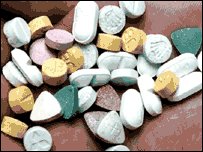Man 'took 40,000 ecstasy tablets'
 Doctors have revealed details of the biggest recorded user of ecstasy - a man estimated to have taken 40,000 ecstasy pills in his life.
Doctors have revealed details of the biggest recorded user of ecstasy - a man estimated to have taken 40,000 ecstasy pills in his life. At the height of his use, the man - known as "Mr A" - was taking 25 tablets a day, Psychosomatics journal revealed.
The 37-year-old still had trouble with short-term memory problems seven years after he stopped taking the drug.
Doctors at St George's Hospital, London said Mr A's case was extreme, but showed ecstasy's long-term effects.The doctors said it was the largest reported ecstasy lifetime consumption by one person, the previous being around 2,000 tablets.
Writing in Psychosomatics, they say Mr A reported he had used ecstasy between the ages of 21 and 30.
For two years, he took five tablets every weekend, rising to an average of 3.5 tablets per day for the next three years, then soaring to 25 tablets a day over the next four years.
After "collapsing" three times at parties, Mr A stopped taking ecstasy.
The team say that, while much of the information on Mr A's drug use was self-reported, and therefore could have been affected by his memory problems, his history was confirmed by medical notes taken just after he stopped taking the drug.
'Behavioural consequences'
Writing in Psychosomatics, the medical team led by Dr Christos Kouimtsidis, said: "For a few months, he felt as if he was still under the influence of ecstasy and suffered several episodes of 'tunnel vision'.
"He eventually developed severe panic attacks, recurrent anxiety, depression, muscle rigidity (particularly at the neck and jaw levels)."
Mr A also experienced hallucinations and paranoid ideas.
When he saw doctors at the addiction centre at St George's Hospital, Tooting, south London, he was still using cannabis, and said he had previously taken solvents, benzodiazepines, amphetamines, LSD, cocaine, and heroin.
There was no mental illness in his family and no previous psychiatric history.
When the doctors carried out tests on Mr A it was found he had memory impairment and "major behavioural consequences of his memory loss" such as repeating activities several times.
This meant that he could not concentrate well and had very poor short-term memory, forgetting the time or what he had put in his supermarket trolley.
However, he seemed unaware he had these problems.
Reducing his cannabis use meant Mr A's paranoia and hallucinations disappeared, and his panic attacks were reduced, but his other symptoms persisted.
He had no family history of psychiatric problems, and his medical record showed he had not had any difficulties prior to his drug use.
A brain scan failed to show any obvious damage or atrophy in his brain, but Dr Kouimtsidis said such a scan was "not sensitive enough".
'Extreme case'
He told the Guardian: "This is probably an extreme case so we should not blow any observations out of proportion.
"But if this is what is happening to very heavy users, it might be an indication that daily use of ecstasy over a long period of time can lead to irreversible memory problems and other cognitive defects."
Mr A discharged himself before doctors were able to complete their assessment and, although they continued to support him, he started to use cannabis again and dropped out.
They tried to regain contact with him, but lost touch about a year ago.
Martin Barnes, chief executive of the charity DrugScope, said: "It is possible to become psychologically dependent on the feelings associated with ecstasy but heavy daily use is extremely rare and it is not thought that people can become physically dependent.
"The short-term effects - in terms of impaired memory, sleep problems and the 'mid-week hangover' - are well documented, but less is known about the longer-term effects, particularly of prolonged use."
0 Comments:
Post a Comment
<< Home